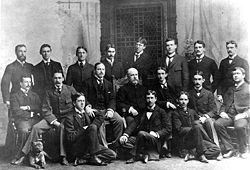
William H. Welch
Encyclopedia
William Henry Welch, M.D. (April 8, 1850 - April 30, 1934) was an American physician
Physician
A physician is a health care provider who practices the profession of medicine, which is concerned with promoting, maintaining or restoring human health through the study, diagnosis, and treatment of disease, injury and other physical and mental impairments...
, pathologist, and medical school administrator. He was one of the "Big Four" founding professors at Johns Hopkins Hospital
Johns Hopkins Hospital
The Johns Hopkins Hospital is the teaching hospital and biomedical research facility of Johns Hopkins University School of Medicine, located in Baltimore, Maryland . It was founded using money from a bequest by philanthropist Johns Hopkins...
. (The "Big Four" were William Osler
William Osler
Sir William Osler, 1st Baronet was a physician. He was one of the "Big Four" founding professors at Johns Hopkins Hospital as the first Professor of Medicine and founder of the Medical Service there. Sir William Osler, 1st Baronet (July 12, 1849 – December 29, 1919) was a physician. He was...
, Professor of Medicine; William Stewart Halsted
William Stewart Halsted
William Stewart Halsted was an American surgeon who emphasized strict aseptic technique during surgical procedures, was an early champion of newly discovered anesthetics, and introduced several new operations, including the radical mastectomy for breast cancer...
, Professor of Surgery; Howard A. Kelly, Professor of Gynecology; and William H. Welch, Professor of Pathology.) He was the first dean of the Johns Hopkins University School of Medicine
Johns Hopkins Hospital
The Johns Hopkins Hospital is the teaching hospital and biomedical research facility of Johns Hopkins University School of Medicine, located in Baltimore, Maryland . It was founded using money from a bequest by philanthropist Johns Hopkins...
and was also the founder of the Johns Hopkins School of Hygiene and Public Health, the first school of public health
Public health
Public health is "the science and art of preventing disease, prolonging life and promoting health through the organized efforts and informed choices of society, organizations, public and private, communities and individuals" . It is concerned with threats to health based on population health...
in the country. The medical school library
Library
In a traditional sense, a library is a large collection of books, and can refer to the place in which the collection is housed. Today, the term can refer to any collection, including digital sources, resources, and services...
is named after Welch. In his lifetime he was referred to as "the Dean of American Medicine".
Biography
Born in Norfolk, ConnecticutNorfolk, Connecticut
Norfolk is a town in Litchfield County, Connecticut, United States. The population was 1,660 at the 2000 census.Norfolk is perhaps best known as the site of the Yale Summer School of Music – Norfolk Chamber Music Festival, which hosts an annual chamber music concert series in "the Music Shed," a...
, Welch was educated at Norfolk Academy
Norfolk Academy
Norfolk Academy is an independent co-educational day school in Norfolk, Virginia. Chartered in 1728, it is the oldest secondary school in Virginia and the eighth oldest in the United States...
and the Winchester Institute. He entered Yale University
Yale University
Yale University is a private, Ivy League university located in New Haven, Connecticut, United States. Founded in 1701 in the Colony of Connecticut, the university is the third-oldest institution of higher education in the United States...
in 1866, where he studied Greek and classics. He received an A.B. degree in 1870. As an undergraduate, he joined the Skull and Bones
Skull and Bones
Skull and Bones is an undergraduate senior or secret society at Yale University, New Haven, Connecticut. It is a traditional peer society to Scroll and Key and Wolf's Head, as the three senior class 'landed societies' at Yale....
fraternity.
After a short period of teaching Greek at Yale as a junior faculty member, Welch went to study medicine at the Columbia University College of Physicians and Surgeons
Columbia University College of Physicians and Surgeons
Columbia University College of Physicians and Surgeons, often known as P&S, is a graduate school of Columbia University that is located on the health sciences campus in the Washington Heights neighborhood of Manhattan...
, in Manhattan
Manhattan
Manhattan is the oldest and the most densely populated of the five boroughs of New York City. Located primarily on the island of Manhattan at the mouth of the Hudson River, the boundaries of the borough are identical to those of New York County, an original county of the state of New York...
. After obtaining his M.D. in 1875, he did extensive postgraduate study in Europe. In 1884, he was the first physician recruited to be a professor at the newly-forming Johns Hopkins Hospital and Medical School at Johns Hopkins University
Johns Hopkins University
The Johns Hopkins University, commonly referred to as Johns Hopkins, JHU, or simply Hopkins, is a private research university based in Baltimore, Maryland, United States...
in Baltimore
Baltimore
Baltimore is the largest independent city in the United States and the largest city and cultural center of the US state of Maryland. The city is located in central Maryland along the tidal portion of the Patapsco River, an arm of the Chesapeake Bay. Baltimore is sometimes referred to as Baltimore...
. By 1886 he had sixteen graduate physicians working in his laboratory - the first postgraduate training program for physicians in the country. He helped the trustees recruit the other founding physicians for the hospital - William Stewart Halsted
William Stewart Halsted
William Stewart Halsted was an American surgeon who emphasized strict aseptic technique during surgical procedures, was an early champion of newly discovered anesthetics, and introduced several new operations, including the radical mastectomy for breast cancer...
, William Osler
William Osler
Sir William Osler, 1st Baronet was a physician. He was one of the "Big Four" founding professors at Johns Hopkins Hospital as the first Professor of Medicine and founder of the Medical Service there. Sir William Osler, 1st Baronet (July 12, 1849 – December 29, 1919) was a physician. He was...
, and Howard Kelly. Welch became head of the Department of Pathology when the hospital opened in 1889. In 1894, he also became the first dean of the Johns Hopkins University School of Medicine, and in 1916, he established and led the Johns Hopkins School of Hygiene and Public Health, the first school of public health
Public health
Public health is "the science and art of preventing disease, prolonging life and promoting health through the organized efforts and informed choices of society, organizations, public and private, communities and individuals" . It is concerned with threats to health based on population health...
in the country. He also established the Institute of the History of Medicine at Johns Hopkins in 1929.
Welch continued to practice and teach pathology. He was a popular teacher. Indeed, his nickname among medical students and postgraduate trainees was, "Popsy." Graduates of his training programs were highly coveted as academic physicians. Medical schools and institutes across the country vied for Welch's former students and graduate scientists to fill top posts. Many of his residents went on to become highly prominent physicians, including Walter Reed
Walter Reed
Major Walter Reed, M.D., was a U.S. Army physician who in 1900 led the team that postulated and confirmed the theory that yellow fever is transmitted by a particular mosquito species, rather than by direct contact...
, co-discoverer of the cause of yellow fever
Yellow fever
Yellow fever is an acute viral hemorrhagic disease. The virus is a 40 to 50 nm enveloped RNA virus with positive sense of the Flaviviridae family....
, and Simon Flexner
Simon Flexner
Simon Flexner, M.D. was a physician, scientist, administrator, and professor of experimental pathology at the University of Pennsylvania . He was the first director of the Rockefeller Institute for Medical Research and a trustee of the Rockefeller Foundation...
, founding director of the Rockefeller Institute for Medical Research.
Welch's research was principally in bacteriology
Bacteriology
Bacteriology is the study of bacteria. This subdivision of microbiology involves the identification, classification, and characterization of bacterial species...
, and he is the discoverer of the organism
Organism
In biology, an organism is any contiguous living system . In at least some form, all organisms are capable of response to stimuli, reproduction, growth and development, and maintenance of homoeostasis as a stable whole.An organism may either be unicellular or, as in the case of humans, comprise...
that causes gas gangrene
Gas gangrene
Gas gangrene is a bacterial infection that produces gas tissues in gangrene. It is a deadly form of gangrene usually caused by Clostridium perfringens bacteria. It is a medical emergency....
. It was named Clostridium welchii in recognition of that fact, but now the organism usually is designated as Clostridium perfringens
Clostridium perfringens
Clostridium perfringens is a Gram-positive, rod-shaped, anaerobic, spore-forming bacterium of the genus Clostridium. C. perfringens is ever present in nature and can be found as a normal component of decaying vegetation, marine sediment, the intestinal tract of humans and other vertebrates,...
.

United States National Academy of Sciences
The National Academy of Sciences is a corporation in the United States whose members serve pro bono as "advisers to the nation on science, engineering, and medicine." As a national academy, new members of the organization are elected annually by current members, based on their distinguished and...
from 1913-1917. He also was president of the American Medical Association
American Medical Association
The American Medical Association , founded in 1847 and incorporated in 1897, is the largest association of medical doctors and medical students in the United States.-Scope and operations:...
in addition to other prestigious associations. He was a founding editor of the Journal of Experimental Medicine
Journal of Experimental Medicine
The Journal of Experimental Medicine is a peer-reviewed academic journal published by the Rockefeller University Press that publishes research papers and commentaries on the physiological, pathological, and molecular mechanisms that encompass the host response to disease...
.
A the age of eighty-four, Welch died on April 30, 1934 of prostatic adenocarcinoma
Adenocarcinoma
Adenocarcinoma is a cancer of an epithelium that originates in glandular tissue. Epithelial tissue includes, but is not limited to, the surface layer of skin, glands and a variety of other tissue that lines the cavities and organs of the body. Epithelium can be derived embryologically from...
at Johns Hopkins Hospital.
Recognition
The William H. Welch Medical Library at Johns Hopkins, which opened in 1929, is named for him.Welch Road, in the vicinity of Stanford University Medical Center
Stanford University Medical Center
Stanford University Medical Center represents the Stanford Hospital and the Lucile Packard Children's Hospital and is located at 300 Pasteur Drive in Stanford, California. Stanford Hospital provides both general acute care services and tertiary medical care for patients locally, nationally and...
in Stanford, California is named in his honor.
Further reading
- Chronology of the Life of William Henry Welch
- Bench and Bedside, December 2007, "Honoring the Past" (This book covers a great deal of Welch's life as well as other medical people of the era.)
- Donald Fleming (1954). William H. Welch and the Rise of Modern Medicine. The Johns Hopkins University Press. ISBN 0-8018-3389-2.
See also
- William H. Welch HouseWilliam H. Welch HouseThe William H. Welch House is a three-story rowhouse located at 935 St. Paul Street, Baltimore, Maryland, and is notable as the residence of William H. Welch from 1891 to 1908. Welch was one of the "Big Four" founding professors at Johns Hopkins Hospital...

